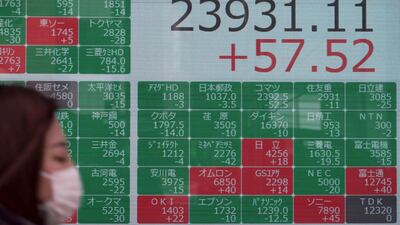Market concerns about coronavirus appeared to ease a little at the end of last week, aligning with an improvement in economic data around the world and suggesting that some fears about the outbreak might have run their course.
Reports that a vaccination may be found were partly responsible for the boost in sentiment, helping markets to look past the immediate impact. However, with the death toll continuing to rise, it will take time for any vaccine to be introduced, meaning that economic growth will still be affected. With other reports detailing the severe disruption the outbreak is causing to supply chains, forcing companies outside of China to slow or halt production, it might not be long before there is also the risk of greater financial market dislocation.
The main boost for market sentiment at the end of last week, however, was a report that China will cut tariffs on some $75 billion (Dh275.47bn) worth of US imports by 50 per cent later this month. Both sides said they would cut tariffs as part of the phase-one trade deal agreed between the US and China last month, which now seems to have been a timely move given the sudden deterioration in China’s economic prospects.
Economic data also provided a respite from the negativity about the coronavirus, helping propel US equities to record highs at one point. The ISM manufacturing and non-manufacturing indices both reached six-month highs in January, while UK and eurozone Purchasing Managers Indexes also performed better. The main release of the week, the January US jobs report, did not disappoint either, with non-farm payrolls increasing by 225,000, double the expectation, after December and November were revised up as well.
The question from here will be: can the current run of improving data compensate for the negative fallout from coronavirus, and will the markets be right in thinking that the coronavirus will simply follow the template of Sars (Severe Acute Respiratory Syndrome) back in 2003. Then, equity markets fell 10-12 per cent in the first quarter of 2003 but subsequently recovered, as did growth in the developing Asian economies from the summer of 2003 onwards.
Indeed, the bounce back from Sars in 2003 meant that the impact over the year was negligible in China and even less damaging elsewhere. Much has changed since 2003, however. China now accounts for 17 per cent of global domestic product compared to just 4 per cent in 2003, and a third of global growth, with its supply chains much more integrated with the global economy.
In 2003, China was also experiencing double-digit growth rates as part of an export-led and investment-led boom, whereas coronavirus is hitting at a time when China has been slowing for a number of years. It is also hitting when the growth outlook for the advanced economies is not great either, leaving policymakers with a limited monetary and fiscal policy space to respond.
This poses particular problems for countries with strong export connections with China, including much of Asia, as well as Australia and the EU. As the US-China trade dispute made clear, China’s trade links and its exchange rate policy have important implications for the rest of the world.
So far, the USD/CNY exchange rate has been stable around the 7 Chinese yuan per $1 level, but capital flight is a risk in a situation where monetary policy continues to be lent on. China also has a corporate debt problem, rising corporate defaults and a fragile banking sector. Any dislocation in the credit system and an increase in money market volatility could put pressure on its financial system, which could have implications globally. Chinese oil demand growth could also be hit, something that is already vexing Opec and forcing it to think about contingencies.
Federal Reserve chairman Jerome Powell delivers his semi-annual testimony on monetary policy to Congress on Wednesday, which will provide a timely insight into Fed thinking on the matter. The Fed’s February Monetary Policy Report, released on Friday, said that coronavirus "could lead to disruptions in China that spill over to the rest of the global economy" but fell short of suggesting the Fed is readying its own contingencies.
Tim Fox is chief economist and head of research at Emirates NBD


